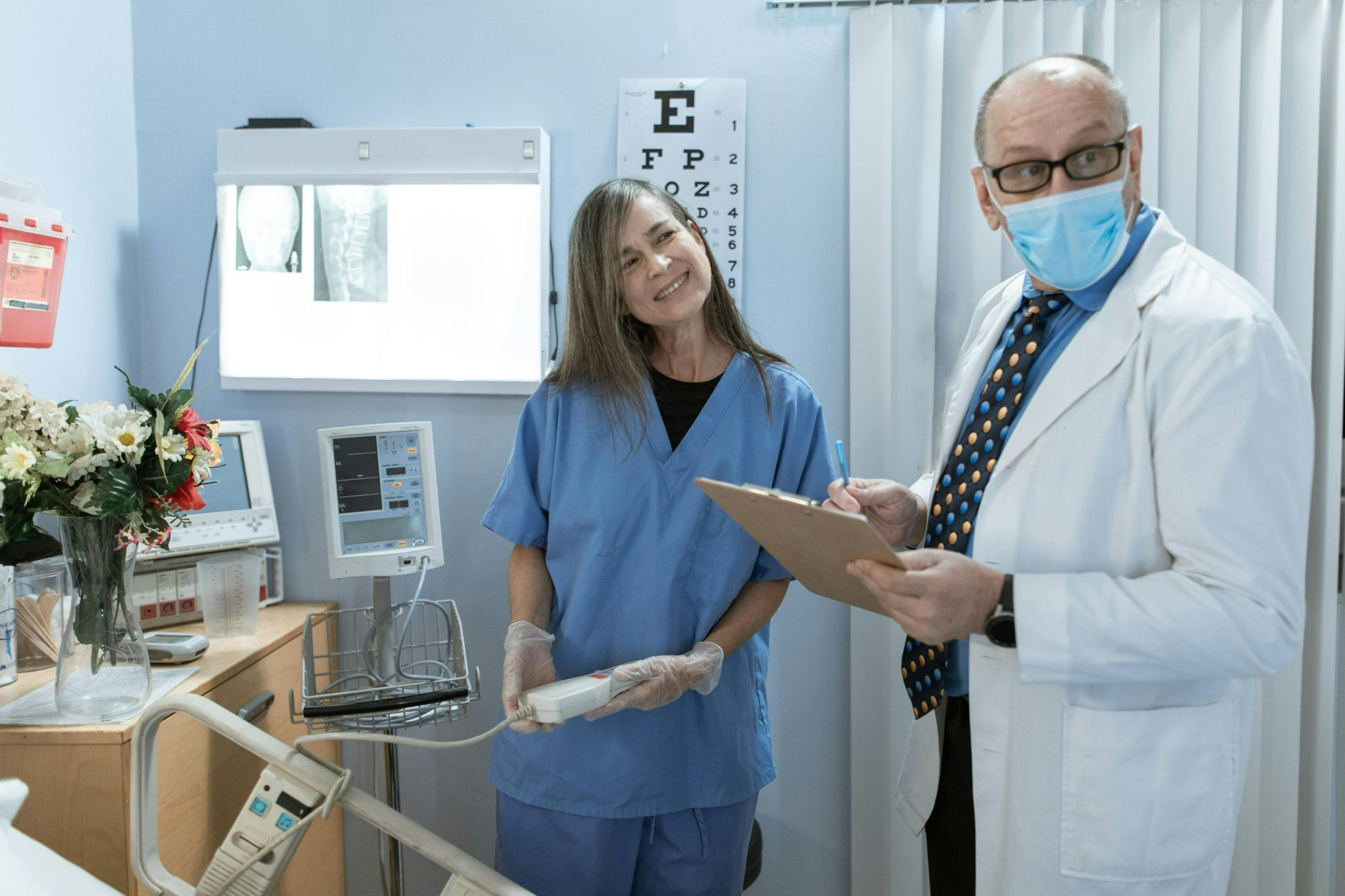LPN vs. CNA: What Are the Differences in Salary, Education and Scope of Practice

Certified nursing assistants (CNAs) and licensed practical nurses (LPNs) are two entry-level positions in the nursing field with important roles within the healthcare environment, especially considering the ongoing nursing staff shortage. Although their job descriptions and workplace activities overlap, the two also feature considerable differences that can change their appeal when considering your future career.
If you have decided to embark on a journey to the nursing profession and want to join the workforce in an entry-level position, we will help you discover the differences between the LPN and CNA positions and decide which best reflects your expectations and professional experiences.
Let’s discuss the points that are central to the LPN vs. CNA comparison, including salary expectations, required education and licensing processes, as well as the job outlooks, duties and scope of practice.

What Is an LPN?
A licensed practical nurse, or licensed vocational nurse in Texas and California, is a healthcare professional who provides primary care and basic support to sick, injured, or disabled patients.
LPNs often represent the forefront of caretaking, being in considerable demand in various healthcare settings, from hospitals, to hospices, or physicians’ offices. However, they can only perform their duties while under supervision and following the instructions of better-certified staff, such as registered nurses (RNs), nurse practitioners (NPs), doctors, or physicians.

What Is a CNA?
A certified nursing assistant is an entry-level role that provides hands-on vital support and care for patients in need across various healthcare settings.
CNAs perform a broad range of practical tasks that concern the daily lives of the patients in their care. While some of their responsibilities are medical, most of their functions center around bettering the quality of life and the services provided to patients. Similar to LPNs, CNAs also need to be under the direct supervision of higher-level nursing staff. However, in addition to RNs, NPs, doctors, or physicians, certified nursing assistants can also be supervised by licensed practical nurses.

LPN vs. CNA Salary Differences
The first essential difference between the LPN and CNA roles is in the expected salary you may expect to earn while occupying each position.
According to the Bureau of Labor Statistics, licensed practical nurses can expect to earn a median salary of $54,620 per year, or $26.26 per hour, at the national level. Comparably, certified nursing assistants earn, on average, $35,760 per year or $17.19 per hour. In other words, LPNs are paid better than CNAs on a national level, taking home $18,880 more per year.
LPN vs. CNA Salary Differences by State
However, there are comparable differences in your expected salary depending on the state in which you profess. For instance, the yearly salary difference between the best paying state and the worst paying state for CNAs amounts to $17,280.
According to the BLS, the first five highest paying states for CNAs are Alaska ($44,420 per year), District of Columbia ($43,820), California ($43,570), New York ($43,450) and Oregon ($42,960). The worst paying states in the US for CNAs are Mississippi ($27,140 per year), Louisiana ($28,190), Alabama ($28,550), Oklahoma ($30,210) and Tennessee ($31,600).
Comparatively, LPNs are best paid in Washington ($69,950 per year), California ($69,930), Massachusetts ($68,170), Rhode Island ($66,770) and Alaska ($66,710). The lowest salaries for LPNs are found in Mississippi ($45,020 per year), Alabama ($45,260), West Virginia ($45,530), Arkansas ($45,990) and South Dakota ($46,000).
Read more about LPN salaries by state to understand your projected payment depending on your area.

Employment Outlook for CNAs and LPNs
Both the CNA and LPN positions are in high demand, with projected growth rates surpassing the 3% increase for all occupants of the healthcare industry. However, certified nursing assistants are more numerous and are projected to have more jobs by 2032 overall despite their growth rate increasing slower.
The overall employment of certified nursing assistants is projected to increase by 4% through 2032, amounting to 209,400 new openings each year. The net change from the current number of CNAs to the projected employment in 2032 would amount to 58,400 new jobs through the decade.
The pool of licensed practical nurses increases at a faster rate of 5%, albeit amounting to a lower number of yearly job openings of 54,400. By 2032, there will be 34,900 new jobs for LPNs in the US.
Where Can CNAs And LPNs Find Employment?
The work settings and the employment outlook for each are similar for LPNs and CNAs, as both roles most often work in nursing care facilities. However, there are proportionally more CNAs than LPNs working in hospitals.
Most certified nursing assistants are employed in nursing care facilities and state nursing and private hospitals, with 33% working in each type of setting. Another 11% find work in facilities providing assisted living services and continuing care retirement communities. Home healthcare services provide employment for another 6% of certified nursing assistants, with government jobs making up another 4%.
Licensed practical nurses find employment most frequently in nursing and residential care facilities, representing 35% of the employment force. Hospitals, whether state, local, or private, employ another 15% of LPNs, home healthcare services employ 13%, and physicians’ offices employ 12% of LPNs, with another 6% of jobs being in government positions.
CNA vs. LPN Salary Differences by Employer
Your future work setting will also affect your salary while also presenting LPN vs. CNA salary differences. Here are the median salaries by work setting for CNAs and LPNs:
|
Work setting |
LPN median salary |
CNA median salary |
|
Government |
$57,200 |
$39,250 |
|
Hospitals (state, local, private) |
$49,760 |
$36,480 |
|
Nursing and residential care facilities |
$58,140 |
$35,480 |
|
Home healthcare services |
$54,080 |
$31,280 |
|
Continuing care retirement communities and assisted living facilities for the elderly |
– |
$34,600 |
|
Physicians’ offices |
$48,300 |
– |
The LPN vs. CNA salary differences based on work settings range from $13,280 for hospitals, up to $22,800 for home healthcare services, averaging at $19,173.

Differences Between LPN and CNA Education
The educational process represents one of the most important differences between the LPN and CNA positions. In general, licensed practical nurses spend more time preparing for licensure and are better prepared in nursing fields, compared to certified nursing assistants.
In order to become a licensed practical nurse, you need to attend a PN diploma program that generally takes one full year to complete. You can pursue PN diploma programs in public and private colleges, technical and vocational schools, as well as medical facilities, such as hospitals.
Certified nursing assistant programs take between 4 and 12 weeks to complete and can be attended in community colleges, vocational or trade schools, hospitals, or online in private colleges and educational institutions. Your certification program of choice should be approved by your state’s nursing board and the National League for Nursing Commission for Education Accreditation (NLN CNEA).
The period of training and the scope of education for CNAs can vary depending on the state in which they are certified, as opposed to LPNs, where there is a national standard.
What LPNs Learn vs. What CNAs Learn in School?
PN diploma programs will acquaint you with core nursing subjects, including biology, pharmacology, and basic nursing practices. Nursing assistant certification programs provide training in areas such as anatomy and physiology, excretory procedures, and practical skills.
Both roles are highly practical and include hands-on tasks, and these aspects are visible in certifying programs.
The curriculum of a PN diploma program is divided into theoretical education and supervised clinical experience. In general, aspiring practical nurses need to complete between 500 and 750 hours of requisite clinical experience. Similarly, CNAs are required to attend clinical hours, but only between 75 and 180 hours, depending on the program and state.
Educational Requirements for LPN vs. CNA Programs
Both the PN diploma and CNA certification programs are undergraduate degrees that require a high school diploma or GED equivalent from their applicants. You will generally have to sit an examination for general education prerequisites for both types of programs.
Although the PN diploma program prepares you for a better-paid and better-prepared position, it is also more demanding on the side of learners, with nursing assistant certification programs allowing for flexible learning paths.
However, with Nightingale College’s PN Diploma Program, you can start your nursing career at the maximum convenience. The hybrid program that combines fully online instruction with on-ground supervised field experience in a setting that is easily accessible for you will allow you to accommodate your current lifestyle and obligations with your education.
Get in touch with Nightingale College and start your nursing career with our PN Diploma Program!
CNA vs. LPN Education Costs
Certified nursing assistants will pay comparatively less for their education, given the shorter program length, less training, and fewer opportunities compared to licensed practical nurses. CNA programs cost from $1,300 to $3,000, while PN diploma program costs range from $12,000 to $15,000.

CNA vs. LPN Licensing and Certification
Once you complete one of the two learning programs, you must sit a specific examination for certification or licensure.
Aspiring practical nurses must sit the NCLEX-PN, held by the National Council of State Boards of Nursing (NCSBN). The exam is a 5-hour timed and computerized adaptive test, with questions consisting of subjects studied during the PN diploma program:
- Management of care
- Safety and infection control
- Health promotion and maintenance
- Psychosocial integrity
- Psychological integrity
- Basic care and comfort
- Pharmacological and parenteral therapies
- Reduction of risk potential
- Physiological adaptation
Once you pass the NCLEX-PN, you become a licensed practical nurse and can work in various settings under the supervision of RNs or other staff.
If you want to prepare for the NCLEX-PN in the most convenient way, consider attending the PN Diploma Program at Nightingale College. The hybrid program combines online theoretical instruction and on-site supervised field experience to prepare you to attend the exam and become an LPN in 12 months. Nightingale College also provides free tutoring, which is specially designed to prepare students to sit and successfully pass the NCLEX.
Start your nursing career with our PN Diploma Program! Send in your application today!
CNA certification is highly dependent on the state in which you are preparing, but generally, you have to attend a specific course and sit a final certification exam. This will consist of two parts: written and practical, respectively.
The written portion of the exam takes 90 minutes and consists of multiple-choice questions. The practical part, also known as the clinical skills exam, has attendees demonstrate competencies in a selection of four clinical skills within 30 minutes. The clinical skills exam is also administered and observed by one test proctor and is attended one at a time.
Once you complete the exam successfully, you can work as a CNA in various healthcare settings, under the oversight of RNs, LPNs, or other staff.

CNA vs. LPN Scope of Practice Differences
Both certified nursing assistants and licensed practical nurses are at the forefront of providing hands-on healthcare and handling patient needs. However, their scope of practice differs depending on their interaction with other staff, as well as based on the usual tasks they perform.
The work of LPNs leans towards providing assistance to registered nurses and physicians in medical tasks. This can include taking vital signs, positioning patients for interventions, collecting samples for routine tests, and providing basic care and support to patients. Licensed practical nurses also need to maintain a clear line of communication between patients, nursing staff, and other caretakers. Thus, they must also keep clear patient records, reinforce and explain to patients the indications of RNs, and maintain a clear line of communication between all parties.
CNAs' tasks focus on assisting patients with daily activities, such as eating, bathing, and dressing, as well as improving the quality of their lives and the provided service. Thus, they will be responsible for bringing meals to patients, maintaining their hygiene, monitoring their health, dressing, and preparing them for examinations. Additionally, CNAs must ensure that patients have taken the prescribed medication. While still under the supervision of other nurses, including LPNs, CNAs do not have the same responsibilities for maintaining constant communication between patients and staff.
Career Advancement Options for LPNs and CNAs
While LPNs and CNAs are entry-level positions into the field of nursing, the career advancement opportunities they open for you are not the same.
If you become a CNA, the ways of advancing your career is by becoming an LPN, via a 1-year PN diploma program, or an RN, via a full-time program. While there are some bridge programs, especially to the LPN position, you will generally be required to take up the programs from scratch.
By contrast, if you are an LPN, you can advance to the RN position by pursuing a 2-year ADN program or a 3-to-4-year BSN program, but also via a faster 16-month LPN-to-ASN bridge program. By pursuing RN licensure, you can unlock more job positions and specializations while also increasing your autonomy in the workplace.
Another method of improving your job situation is by earning certifications and accreditations for various tasks and positions. Both CNAs and LPNs have a wide array of certifications they can earn without advancing to a higher role. Certified nursing assistants can generally pursue accreditation for caregiving for sensitive patient groups (for example, Alzheimer’s caregiving or hospice and palliative nursing assistance) or for advancing their medical knowledge (such as wound care or medication aide certifications). Licensed practical nurses will often obtain certificates for highly specialized tasks, such as IV therapy or oxygen administration.

Should You Become a CNA or an LPN?
Whether you should become a CNA or an LPN will depend on your expectations from your nursing work, the desired career path, and your willingness and material capabilities to embark on their respective learning programs.
The CNA position finds its appeal in the short and low-requirement learning program, as well as in the lower threshold of responsibility in a future work environment. It is a good path to take, if you want to consolidate your basic nursing skills and accumulate experience, and that is why many hospitals allow students of BSN Programs to work as CNAs after their first year in school.
The LPN position comes with slightly more responsibilities and better job benefits, especially in payment, albeit requiring more time and commitment on your part. However, not only is it a good option for “testing the waters” of nursing as a long-term career, but it can also open faster routes to advancing to better positions, such as via the LPN-to-ASN path that promotes you to an RN in as few as 16 months.
In short, becoming a CNA is the bare minimum for entering the nursing industry, while LPNs are already considered to be nurses, with extensive responsibilities. While both are supervised positions, their day to day tasks will differ, with LPNs performing more medical ones, while CNAs being preoccupied with the caretaking of patients.
No matter which path you decide to take, we are beside you in your career to become a nurse and excel in your career.
Whether you decide to become an LPN right away or intend to keep it as an option for later on, the PN Diploma Program at Nightingale College is the easiest and most accessible option for your education. That is because we combine fully online concept-based theoretical education with the required on-ground supervised field experience to deliver to you the most effective way of sitting and passing the NCLEX-PN.
Start your nursing journey with our PN Diploma Program! Send in your application today!
LPN vs. CNA FAQs
Who Gets Paid More Between LPNs and CNAs?
Licensed practical nurses paid better than certified nursing assistants, both in general and in each work setting they can access. Overall, median LPN salaries are higher than CNA salaries by $18,880, with differences based on the work environment, ranging from $13,280 for hospitals up to $22,800 for home healthcare services, with an average of $19,173.
Are LPNs Like CNAs?
LPN and CNA roles are similar in that they are entry-level positions for aspiring nurses, require supervision from other staff, and assume hands-on tasks. However, their scope of work differs considerably, with LPNs taking up more medical ones while CNAs deal with the primary care and upkeep of patients. Their educational requirements are also completely different, with LPNs spending more time in school.
Are LPNs and CNAs Considered Nurses?
As their name implies, only LPNs are considered nurses, with CNAs being only assistants to nurses, a difference that is reflected in the scope of their tasks and responsibilities. This is also why licensed practical nurses can supervise certified nursing assistants but not the other way around.
Should You Become a CNA Before an LPN?
You should consider becoming a CNA only if you want to accumulate basic experience in a healthcare setting without committing to a 1-year PN Diploma Program. However, remember that you will eventually have to advance to LPN or RN positions.
Read our LPN vs. RN comparison to figure out which specialization you should pursue if you already are a CNA or consider becoming one first.
How Can You Become an LPN as a CNA?
While you may find some accelerated programs for advancement, you will generally need to pursue a complete 1-year PN Diploma Program.
If you do so at Nightingale College, you can proceed with your education in the most convenient way that fits your lifestyle and obligations. Beyond the hybrid online-learning-on-ground-practical framework that ensures maximum accessibility for our learners, we also guarantee that our concept-based curriculum and additional tutoring materials fully prepare you to sit and pass the NCLEX-PN.
Send in your application today and advance your career with our PN Diploma Program!

